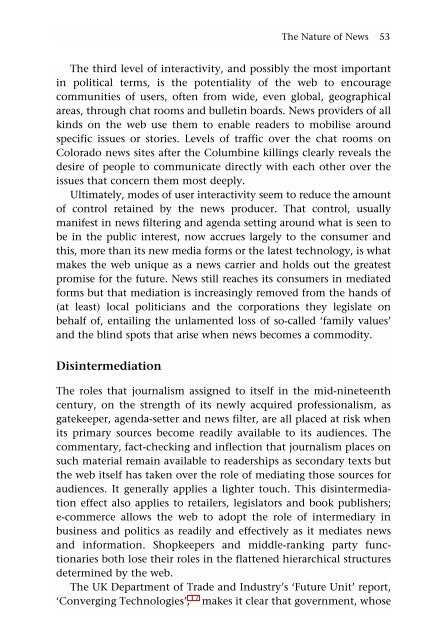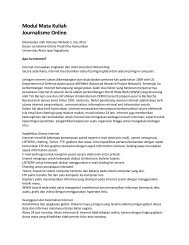Online Journalism - Ayo Menulis FISIP UAJY
Online Journalism - Ayo Menulis FISIP UAJY
Online Journalism - Ayo Menulis FISIP UAJY
You also want an ePaper? Increase the reach of your titles
YUMPU automatically turns print PDFs into web optimized ePapers that Google loves.
The third level of interactivity, and possibly the most important<br />
in political terms, is the potentiality of the web to encourage<br />
communities of users, often from wide, even global, geographical<br />
areas, through chat rooms and bulletin boards. News providers of all<br />
kinds on the web use them to enable readers to mobilise around<br />
specific issues or stories. Levels of traffic over the chat rooms on<br />
Colorado news sites after the Columbine killings clearly reveals the<br />
desire of people to communicate directly with each other over the<br />
issues that concern them most deeply.<br />
Ultimately, modes of user interactivity seem to reduce the amount<br />
of control retained by the news producer. That control, usually<br />
manifest in news filtering and agenda setting around what is seen to<br />
be in the public interest, now accrues largely to the consumer and<br />
this, more than its new media forms or the latest technology, is what<br />
makes the web unique as a news carrier and holds out the greatest<br />
promise for the future. News still reaches its consumers in mediated<br />
forms but that mediation is increasingly removed from the hands of<br />
(at least) local politicians and the corporations they legislate on<br />
behalf of, entailing the unlamented loss of so-called ‘family values’<br />
and the blind spots that arise when news becomes a commodity.<br />
Disintermediation<br />
The Nature of News 53<br />
The roles that journalism assigned to itself in the mid-nineteenth<br />
century, on the strength of its newly acquired professionalism, as<br />
gatekeeper, agenda-setter and news filter, are all placed at risk when<br />
its primary sources become readily available to its audiences. The<br />
commentary, fact-checking and inflection that journalism places on<br />
such material remain available to readerships as secondary texts but<br />
the web itself has taken over the role of mediating those sources for<br />
audiences. It generally applies a lighter touch. This disintermediation<br />
effect also applies to retailers, legislators and book publishers;<br />
e-commerce allows the web to adopt the role of intermediary in<br />
business and politics as readily and effectively as it mediates news<br />
and information. Shopkeepers and middle-ranking party functionaries<br />
both lose their roles in the flattened hierarchical structures<br />
determined by the web.<br />
The UK Department of Trade and Industry’s ‘Future Unit’ report,<br />
‘Converging Technologies’, 17 makes it clear that government, whose
















